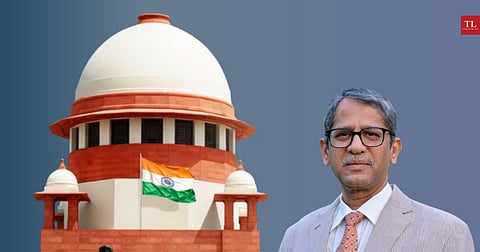

THE Chief Justice of India (CJI) Thursday criticised the existence of a law on sedition even after 75 years of the country's independence. The sedition law is a colonial law, he said, while pointing out that it was used against freedom fighters like Mahatma Gandhi and Tilak. "Is this law still required to exist?" he asked
These queries were made by CJI to Attorney General(AG) KK Venugopal.
The court was hearing a petition filed by army veteran S.G. Vombatkere who has challenged the constitutional validity of Section 124A[Sedition] of the Indian Penal Code(IPC).
The CJI-led bench said its concern was the misuse of the law by the executive without any accountability.
"Use of the sedition law is like giving a saw to the carpenter to cut a piece of wood, and he uses it to cut the entire forest itself", he said.
"Your government has repealed many stale laws, I do not know why your government is not looking into repealing Section 124A of the IPC?" CJI Ramana asked AG Venugopal.
The bench which also had Justices AS Bopanna and Hrishikesh Roy issued notice to the Centre and said it would hear the matter soon.
AG Venugopal said Section 124A may not have to be repealed but parameters may be laid down.
Appearing for the petitioner, advocate PB Suresh said there was no presumption of constitutionality attached to Section 124A of the IPC since a five-judge bench in the Navteej Singh Johar case held pre-constitution legislations did not enjoy a presumption of constitutionality.
In his petition, Vombatkere has contended that Section 124A of the IPC is wholly unconstitutional.
"A statute criminalising expression based on unconstitutionally vague definitions of 'disaffection towards Government' etc. is an unreasonable restriction on the fundamental right to free expression guaranteed under Article 19(1)(a) and causes a constitutionally impermissible 'Chilling Effect' on speech", Vombatkere contends.
The petition filed through Advocate-on-Record Prasanna S contends that the reasoning employed in the five-judge bench decision in the Kedar Nath Singh v. State of Bihar(1962) to uphold the sedition law has stood overruled by the development of both domestic fundamental rights jurisprudence, as well as international human rights jurisprudence.
The plea adds that the reading down of Section 124A in the Kedar Nath Singh case has not served the purpose and as the recent surge in the filing of sedition cases indicates, to ensure that the criminal process is not used to chill the free expression of citizens – particularly political expression critical of or against the government that is for the time being in power, it is imperative that a more effective judicial tool is employed i.e. the unambiguous striking down of the provision and to declare that all pending proceedings in respect of sedition stand closed.
In a similar petition filed by journalists Kishorechandra Wangkhemcha from Manipur and Kanhaiya Lal Shukla from Chhattisgarh, the top court on April 30 agreed to examine the validity of the sedition law and issued notice to the Central Government as well as the Attorney General for India.
In the Kedarnath case, the top court had upheld the validity of the sedition law although it had narrowed down its scope and held "comments, however strongly worded, expressing disapprobation of actions of the Government, without exciting those feelings which generate the inclination to cause public disorder by acts of violence" was not sedition.
In 2016, the Supreme court reminded the authorities to be guided by the principles laid down in the Kedarnath case while dealing with sedition cases. Despite that, governments have been using the law to curb dissent.
Also Read: The Law of Sedition and Bal Gangadhar Tilak